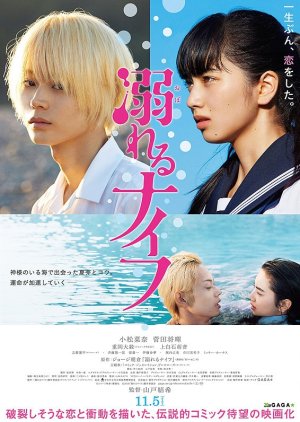A few days ago I watched the film drowning love. I didn’t think much of the choice, thinking it was a typical Japanese romance film. (I do love Japanese cinema) I was very wrong. Although it was promoted as a romance, it was so, so much more. I was bowing down, impressed and in awe of everything it had to offer. It touched and shocked me emotionally, which is what an extremely good film does. I hadn’t felt this way about a film since Confessions (also a Japanese film, but that is more of a psychological thriller). I’ve seen films with wonderful cinematography before, but not much yet. The cinematography, the music, the metaphors, symbolism, characterisation, were all so beyond beautiful. I’m not sure if everyone would agree with this, as I’ve realised people have found the plot confusing, and I too, sometimes felt the dialogue and behaviours of the characters seemed odd to the situations, but in the end everything made perfect sense. At times it felt like I was watching an abstract poem unfold, the director was transitioning in time with the scenes, revealing what we didn’t see before, and adding details of each occurring at the perfect times. This film had the complexity of romance, youth, religion, friendship, beauty, trauma, pressure from society, etc all strung together in a whimsical melody. Speaking of melodies, the music was beyond perfect. I don’t think I’ve watched a film where the score fitted so well with the screenplay. At times it felt youthful, like the life you’ve always wanted is about to start, other times you are grieving for something that wasn’t yours in the first place. The most impressive is the piano score which I felt perfectly encompasses all the complex feelings the character goes through in the entire film.
I felt very inspired by this work, there were so many layers to this film I could dissect and uncover, but before digging too deep into it I wanted to experiment with some stills. I knew I wanted to paint scenes from it, because there were so many scenes that were just beautiful and perfectly distanced from the camera in a way you wouldn’t expect. there was also a lot of shots that were only one take, lasting for a minute or so, for example when Natsume notices Koh and slowly walks and follows him across the road, then the bridge, accelerating into a desperate chase as he runs away. There was so much running, or more specifically chasing scenes. At first it seemed more playful and flirtatious, but as the film progresses the dynamic changes more melancholy. The constant is that it was always Natsume chasing Koh, which made me think that this might be one of the many metaphors used in this work. Of course, the obvious one is when Natsume was painting her toenails, a typical scene of a teenage girl. She painted almost all of them blue, and the scene changes into one where Koh was swimming freely (not falling into the water like we’ve seen him previously in that cut) deep in the blue ocean. Then she suddenly paints the last toenail red, as she thinks of Ohtomo and the red flowers he told her to suck the nectar out of. Her mind was full of Koh, but it’s apparent that Ohtomo is slowly coming into the picture. She felt joyous and care-free when she was with him, completely different to with Koh. It’s a very complex feeling because she was falling in love with Ohtomo but her heart was still clinging onto the mysterious, reckless Koh.
Since the beginning of the film, Natsume has been asking Koh about God. In a small town where religion is very central, they have an area of the ocean that was forbidden to the people, as it was believed that it would bring bad fortune to the people on the seas. The first time Natsume met Koh, he was drifting in that forbidden pool with an empty gaze. She was extremely curious and walked towards him across the rocky surfaces. He suddenly got up, sprinted towards her, and stopped right in front of her. Leaning in, he said, So we finally meet. In the later parts of the film, it gets revealed to us that he also said ‘Don’t tell anyone,’ as he leaves Natsume, making the audience wonder if he meant their innocent encounter or if something more had happened. A lot of the dialogue across the film centres around the theme of god, strength, and youth. I personally felt that the director portrayed their youthful days being contaminated with forced maturity perfectly (e.g. after Natsume almost got raped and Koh wasn’t able to fight him off)
Of course, I could say so much more about the details of this film, and I feel it is the type of film where you learn something new every time you watch it. Instead, I went on ahead to watch it a second time to screenshot every scene that was beautiful / significant (which turned out to be every scene, I collected nearly 400 screenshots, but I'll attach some highlights here)























































